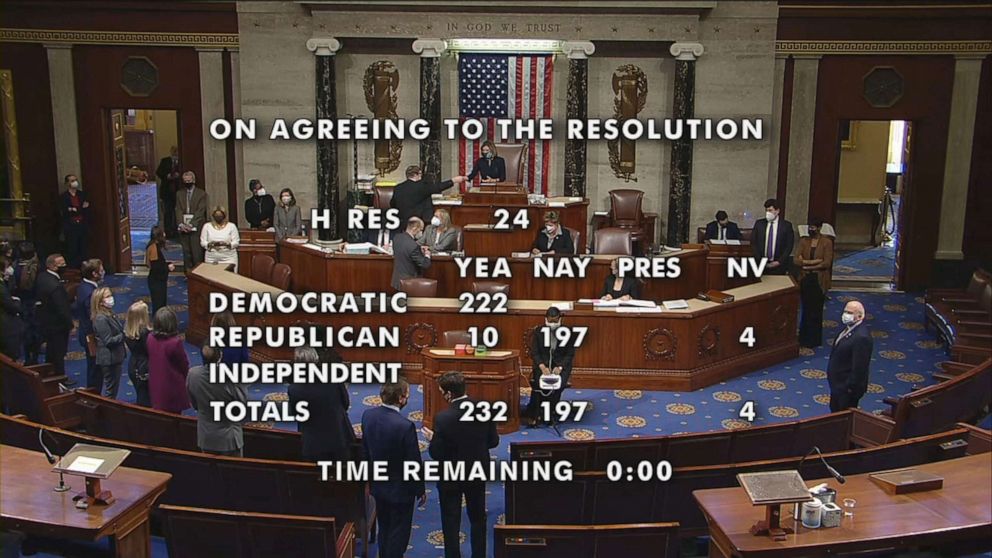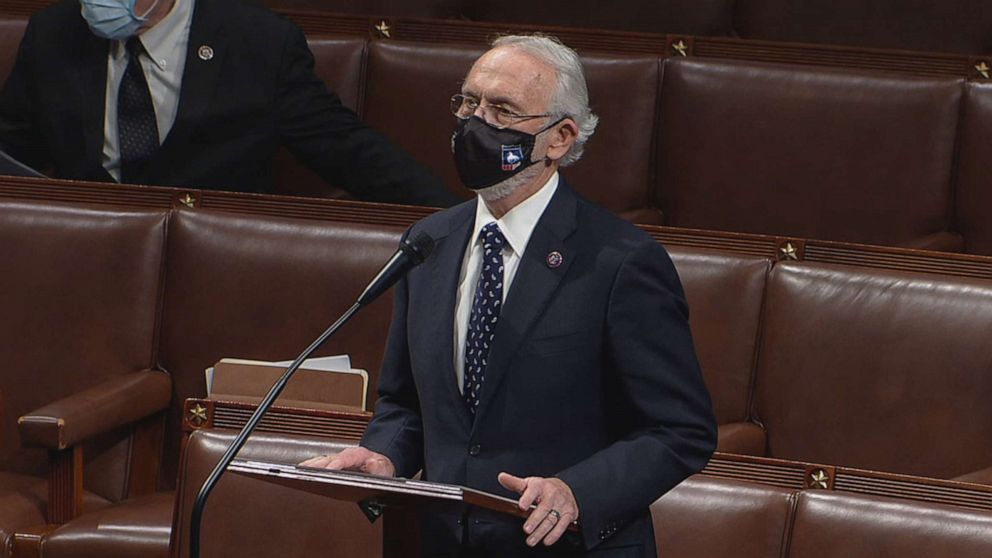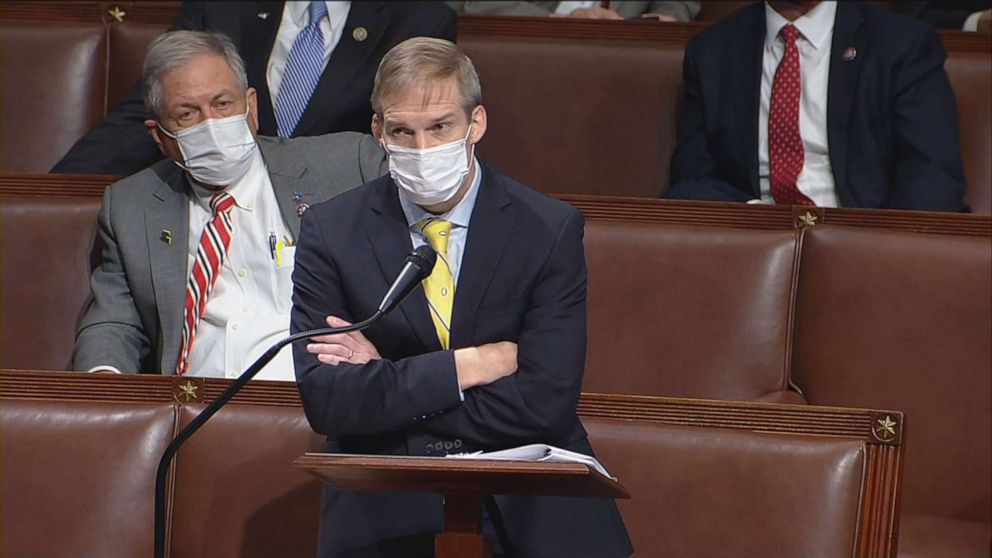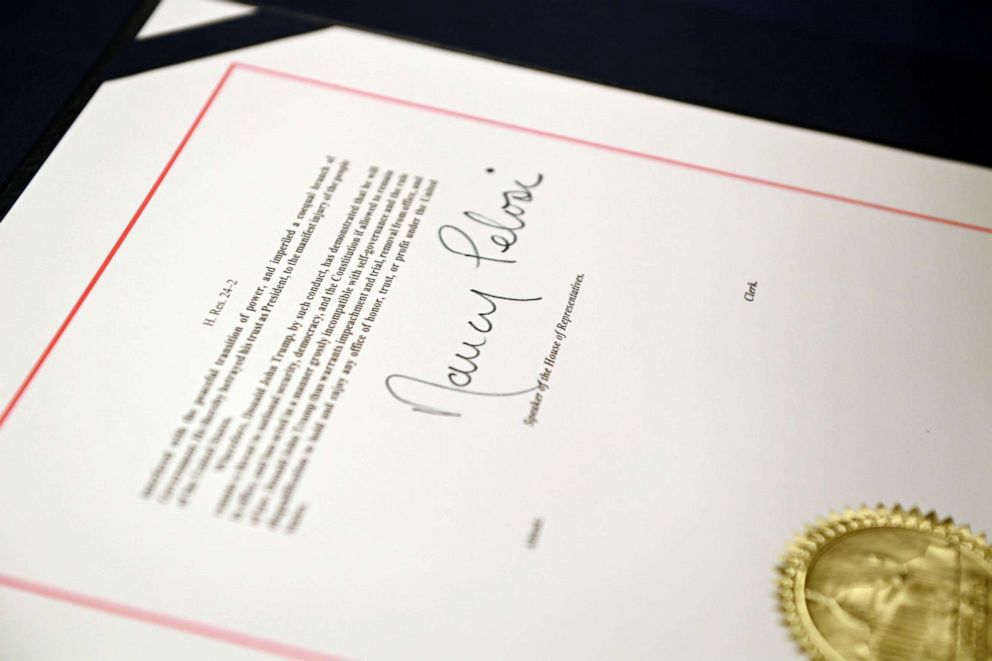Trump makes history as 1st president to be impeached a 2nd time
The House of Representatives voted to impeach President Donald Trump on Wednesday, 232-197, with 10 Republicans voting with all Democrats to charge the president with inciting supporters to storm the U.S. Capitol last week, a riot that left five people dead.
The unprecedented vote, just over a year after his first impeachment -- made Trump the first president in U.S. history to be impeached by Congress twice. It was also the largest bipartisan impeachment vote in American history.
Over hours of debate in an empty Capitol surrounded by thousands of National Guardsmen and several new layers of security measures after last week's insurrection, Democrats argued that Trump presented enough danger to the country that he merited impeachment from Congress with just seven days left in his term.

"The president of the United States incited this insurrection, this armed rebellion, against our common country. He must go," House Speaker Nancy Pelosi, D-Calif., said on the House floor. "He is a clear and present danger to the nation that we all love."
The 10 Republicans who voted to impeach Trump were: Reps. Liz Cheney, R-Wyo. -- the No. 3 Republican in House leadership -- Rep. Anthony Gonzalez, R-Ohio, Rep, Jamie Herrera Beutler, R-Wash., Rep. John Katko, R-N.Y., Rep. Adam Kinzinger, R-Ill., Rep. Peter Meijer, R-Mich., Rep. Dan Newhouse, R-Wash., Rep. Tom Rice, R-S.C., Rep. Fred Upton, R-Mich., and Rep. David Valadao, R-Calif.
Of that group, just Herrera Beutler and Newhouse spoke on the House floor in support of impeachment.

"I'm not afraid of losing my job," the congresswoman said. "But I am afraid my country will fail."
Few Republicans who spoke on Wednesday defended Trump's supportive comments to demonstrators who later converged on the Capitol or his delayed response to the riot that forced members of Congress into lockdown.
Instead, some of the president's closest allies accused Democrats of trying to score political points over the tragedy and warned them that triggering an impeachment trial that is unlikely to begin until after Joe Biden's inauguration will further inflame tensions in the country.
"They want to cancel the president," Rep. Jim Jordan, R-Ohio, said on the floor.

Others accused Democrats of hypocrisy by comparing the riot at the Capitol to scattered episodes of violence this summer during the wave of social justice protests after the death of George Floyd, who died in police custody in Minneapolis.
House Minority Leader Kevin McCarthy, R-Calif., condemned Trump's actions and said he "bears responsibility" for the attack last week.
"A vote to impeach will further divide the nation," he added.
McCarthy also called on Trump to "accept his share of the responsibility."
In a video released shortly after the vote, the president condemned the violent attack on the Capitol and called for an end to further violence, but made no mention of the impeachment vote or any role he may have played in inciting the riot.
The House impeached Trump last year for his phone call to Ukraine's president encouraging efforts to dig up dirt on then-candidate Biden. No House Republicans backed that effort and just one GOP senator voted with Democrats to convict.

Democrats will need the support of 17 GOP senators to convict Trump, and get a majority vote that would bar him from holding federal office again.
Senate Majority Leader Mitch McConnell, R-Ky., in a letter to GOP senators on Monday, said the process would begin "at our first regular meeting" after receiving articles from the House. The chamber is scheduled to return on Jan. 19 -- setting up a trial that would begin as Biden begins his term following his Jan. 20 inauguration.
McConnell sent a note to his Republican colleagues Wednesday afternoon stating that he had not made a final decision on how he would vote in an impeachment trial.
"I intend to listen to the legal arguments when they are presented to the Senate," he wrote.
ABC News' Allison Pecorin contributed to this report.



